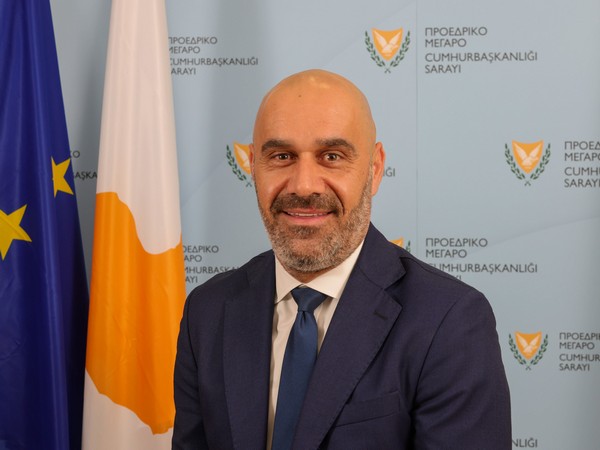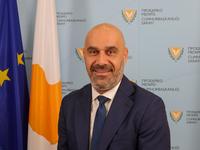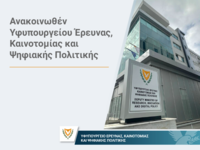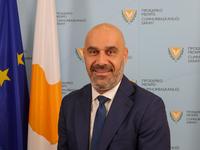Press Releases

15-06-2023 20:00
Address by the Deputy Minister of Research, Innovation and Digital Policy, Mr Philippos Hadjizacharias, at the informative seminar ‘The role of Standards in Empowering the Adoption of Distributed Ledger Technologies: Blockchain'
Allow me to start by congratulating the Cyprus Organization for Standardization, the Institute of the Future of the University of Nicosia and the Cyprus BlockChain Technologies for co-organizing today’s seminar on the role of standards in empowering the adoption of Distributed Ledger Technologies, which is taking place under my auspices.
The Fourth Industrial Revolution, also known as Industry 4.0, is taking place around the globe and is characterized by the convergence of cutting-edge trends and technologies including the Internet of Things, robotics, virtual reality, and artificial intelligence.
Blockchain and Distributed Ledger Technology (DLT) are ground-breaking innovations that are revolutionizing the world by enabling the decentralized recording of transactions, data, and other information. DLTs are more resilient to cybercrimes, fully transparent, accountable, largely automated, and more inclusive. Moreover, they increase organizational efficiency through decentralization and reduce expenses. For instance, IBM uses the technology in its Hyperledger Fabric, a scalable and modular platform utilized by various companies throughout different industries. Fujitsu has already developed a DLT that can improve transparency and prevent cybercrime and fraud in supply chains through improved data tracking.
Distributed ledger technology can support many applications like decentralized marketplaces, smart contracts, and asset tokenization, just to name a few.
Its implementation offers countless opportunities across numerous industries and new security models for the information gathered; as a result, it has the potential to be a major economic driver. The fact that with DLT we maintain tamper-proof transaction records, enables the modernization of public administration through the development of new administrative techniques. As a result, the deployment of DLT has the potential to combat corruption, tax evasion, money laundering, and contribute to the detection of illegal transactions.
In this regard, the European Blockchain Partnership was established on April 10, 2018, and its goals include facilitating the necessary actions in preventing and combating corruption, tax evasion, unlawful payments, money laundering, and the misappropriation of assets. It also includes the safeguards required to ensure consumer, investor, and environmental protection, legal certainty, and transparency.
The Republic of Cyprus signed the European Blockchain Partnership on June 4, 2018, and on December 4, 2018, it signed the joint "Declaration of the Southern Mediterranean Countries on Distributed Ledger Technologies" with six other European member states (Malta, France, Greece, Italy, Portugal, and Spain). Both agreements aim to strengthen digital cooperation and position Southern Europe as a leader in cutting-edge technologies like DLT. Our country’s strategy aims to build on previous initiatives and encourage improved comprehension and appropriate application of DLT and blockchain technology by Cyprus's public and business sectors. Cyprus wants to build on the advancements made to date in collaboration with other EU Member States and top DLT/blockchain professionals in order to lead innovation in the corresponding field. Currently, Europe holds the second most significant share in the Blockchain technology market. As documented by the European Union Blockchain Observatory and Forum, the academic community in Cyprus, has been active in the blockchain field. Cyprus belongs to the main hotspots for blockchain technology in Europe. It is no coincidence that the academic institutions of our country play a leading role in the preparation of studies in the European blockchain ecosystem. For instance, the extensive study of the European Observatory and Forum on Blockchain published in 2020, was coordinated by the Institute for the Future (IFF) of the University of Nicosia. According to the study, in terms of the maturity level of the business ecosystem, Cyprus is among the pioneer countries in Europe, having implemented a national strategy to promote blockchain as early as 2019. A Cypriot university, the University of Nicosia is leading the way globally, offering not only the first master's program in the field, but also a free introductory course in digital currencies, which has been taught to more than 40,000 students from 100 countries.
Furthermore, the local industry is actively exploring applications of blockchain technology, with pilot projects currently being implemented in the financial services and other industries. The Government also supports blockchain through Research and Development programs. A sound example is the pilot program for academic titles, which is funded by European and national funds and implemented in collaboration with the University of Nicosia and the advanced technology company "Talos". This use-case will highlight the impact that blockchain will have on providing an all-in-one-solution for challenges faced by academic institutions and accreditation authorities dealing with certificates/credentials, such as fraud, lost certificates and tampered certificates, which otherwise result in expensive and time-consuming issuance, verification, recovery of lost or modified certificates, if at all possible.
However, DLTs are not without downsides, which present challenges to widespread adoption. They are more complex than traditional solutions, more difficult to scale and somewhat risky due to the lack of regulations. In most cases, the lack of proper regulation was driving companies to avoid the technology. The recent EU legislation, in particular the Regulation on the Markets in Crypto-assets (MiCA), will allow to better exploit the potential of cryptocurrencies and mitigate risks. In order to encourage the development and use of these technologies, European legislation aims to stimulate innovation while safeguarding financial stability, transparency and market integrity, and protecting investors and consumers from potential risks. The European Union promotes innovation in blockchain technology and the development of the ecosystem of distributed ledger technologies in general, aspiring to consolidate Europe's position as a global leader in this rapidly developing technology.
Dear friends,
Ladies and gentlemen,
Developing International and European standards for blockchain technologies, as a new field of technical activity will significantly benefit the economy as a whole, by providing significant advantages to the private sector, to government transactions and to the banking system. ISO/TC 307aims to meet the growing need for standardization in this area by providing internationally agreed ways of working with it, to improve security, privacy and facilitate worldwide use of the technology through better interoperability. This is especially relevant due to the number of SMEs, across various sectors, that are developing blockchain and distributed ledger technologies as a product. The development of blockchain and electronic ledger standards will assist this new emerging technology to be rolled out and deployed with greater clarity, certainty and market confidence. It is important that interested stakeholders from Cyprus participate in standardization work. In this context they can be part in the creation of International and European standards on blockchain and DLT, support the economic and industry interests of Cyprus in the global standardization competitive environment, and equally important improve their technical competences.
Dear friends,
The European Blockchain Observatory and Forum has highlighted our country as one of the top three hotspots for blockchain technology in Europe. This success is no accident. As part of the Cyprus National Strategy for Decentralized Technologies and Blockchain - which is being implemented from 2019 - we seek to further invest in this effort, even after the end of the Project. Therefore, the Deputy Ministry of Research, Innovation and Digital Policy, will aim for the gradual transition of our national hub to a production environment, while implementing relevant applications for the benefit of citizens.
Thank you.
* The seminar took place at the University of Nicosia
________________
MK
Relevant Press Releases







